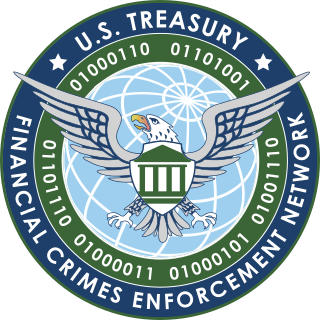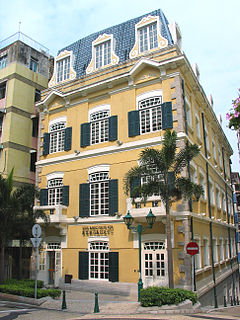Related Research Articles

Money laundering is the process of concealing the origin of money, obtained from illicit activities such as drug trafficking, corruption, embezzlement or gambling, by converting it into a legitimate source. It is a crime in many jurisdictions with varying definitions. It is usually a key operation of organized crime.

The Financial Crimes Enforcement Network (FinCEN) is a bureau of the United States Department of the Treasury that collects and analyzes information about financial transactions in order to combat domestic and international money laundering, terrorist financing, and other financial crimes.

The Bank Secrecy Act of 1970 (BSA), also known as the Currency and Foreign Transactions Reporting Act, is a U.S. law requiring financial institutions in the United States to assist U.S. government agencies in detecting and preventing money laundering. Specifically, the act requires financial institutions to keep records of cash purchases of negotiable instruments, file reports if the daily aggregate exceeds $10,000, and report suspicious activity that may signify money laundering, tax evasion, or other criminal activities.
In financial regulation, a Suspicious Activity Report (SAR) or Suspicious Transaction Report (STR) is a report made by a financial institution about suspicious or potentially suspicious activity. The criteria to decide when a report must be made varies from country to country, but generally is any financial transaction that does not make sense to the financial institution; is unusual for that particular client; or appears to be done only for the purpose of hiding or obfuscating another, separate transaction. The report is filed with that country's financial crime enforcement agency, which is typically a specialist agency designed to collect and analyse transactions and then report these to relevant law enforcement. Front line staff in the financial institution have the responsibility to identify transactions that may be suspicious and these are reported to a designated person that is responsible for reporting the suspicious transaction. This means that the front line staff can ask questions and, in some cases, even decline suspicious transactions. The financial institution is not allowed to inform the client or parties involved in the transaction that a SAR has been lodged, otherwise known as tipping off under the Financial Action Task Force's Recommendations.
HSBC Bank USA, National Association, an American subsidiary of multinational company HSBC, is a bank with its operational head office in New York City and its nominal head office in McLean, Virginia. HSBC Bank USA, N.A. is a national bank chartered under the National Bank Act, and thus is regulated by the Office of the Comptroller of the Currency (OCC), a part of the U.S. Department of the Treasury. The company has 159 branch locations.

Delta Asia Financial Group is a Macau-based bank owned by the Delta Asia Financial Group and founded in 1935 by Au Wing Ngok, father of Stanley Au, the current chairman and majority shareholder. It is the 10th largest bank in Macau with eight branches and 150 employees.
The USA PATRIOT Act was passed by the United States Congress in 2001 as a response to the September 11, 2001 attacks. It has ten titles, each containing numerous sections. Title III: International Money Laundering Abatement and Financial Anti-Terrorism Act of 2001 is actually an act of Congress in its own right as well as being a title of the USA PATRIOT Act, and is intended to facilitate the prevention, detection and prosecution of international money laundering and the financing of terrorism. The title's sections primarily amend portions of the Money Laundering Control Act of 1986 and the Bank Secrecy Act of 1970.
The USA PATRIOT Act was passed by the United States Congress in 2001 as a response to the September 11 attacks in 2001. It has ten titles, with the third title written to prevent, detect, and prosecute international money laundering and the financing of terrorism.
A Customer Identification Program (CIP) is a United States requirement, where financial institutions need to verify the identity of individuals wishing to conduct financial transactions with them and is a provision of the USA Patriot Act. More commonly known as know your customer, the CIP requirement was implemented by regulations in 2003 which require US financial institutions to develop a CIP proportionate to the size and type of its business. The CIP must be incorporated into the bank's Bank Secrecy Act/Anti-money laundering compliance program, which is subject to approval by the financial institution's board of directors.
The Egmont Group of Financial Intelligence Units is an international organization that facilitates cooperation and intelligence sharing between national financial intelligence units (FIUs) to investigate and prevent money laundering and terrorist financing. National FIUs collect information on suspicious or unusual financial activity and are responsible for processing and analyzing the information received. FIUs are normally not law enforcement agencies themselves, findings are shared with appropriate law enforcement or prosecution bodies if sufficient evidence of unlawful activity is found. The Egmont Group is headquartered in Toronto, Ontario, Canada.
Financial intelligence (FININT) is the gathering of information about the financial affairs of entities of interest, to understand their nature and capabilities, and predict their intentions. Generally the term applies in the context of law enforcement and related activities. One of the main purposes of financial intelligence is to identify financial transactions that may involve tax evasion, money laundering or some other criminal activity. FININT may also be involved in identifying financing of criminal and terrorist organisations. Financial intelligence can be broken down into two main areas, collection and analysis. Collection is normally done by a government agency, known as a financial intelligence organisation or Financial Intelligence Unit (FIU). The agency will collect raw transactional information and Suspicious activity reports (SAR) usually provided by banks and other entities as part of regulatory requirements. Data may be shared with other countries through intergovernmental networks. Analysis, may consist of scrutinizing a large volume of transactional data using data mining or data-matching techniques to identify persons potentially engaged in a particular activity. SARs can also be scrutinized and linked with other data to try to identify specific activity.

James F. Sloan was an American intelligence official who served as the Assistant Commandant for Intelligence and Criminal Investigations for the United States Coast Guard and head of Coast Guard Intelligence from November 17, 2003 to February 27, 2009. He was responsible for directing, coordinating, and overseeing intelligence and investigative operations and activities that support all U.S. Coast Guard mission objectives, the national strategy for Homeland Security, and National Security objectives.

Stuart A. Levey was the first Under Secretary for Terrorism and Financial Intelligence within the United States Department of the Treasury. He was sworn in on July 21, 2004 as a political appointee of President George W. Bush. President Barack Obama asked Levey to remain in his position and Levey was one of only a small number of Senate-confirmed Bush appointees who served in the Obama Administration.
The Office of Terrorism and Financial Intelligence (TFI), formed in 2004, is an agency of the United States Department of the Treasury. TFI works to reduce the use of the financial system for illicit activities by terrorists, money launderers, drug cartels, and other national security threats.
Banca Privada d'Andorra was a bank in Andorra founded in 1957.
First Merchant Bank OSH Ltd (FMB) was an offshore bank of Northern Cyprus established in 1993. As an offshore bank it was not regulated by the Central Bank of the Turkish Republic of Northern Cyprus, and not allowed to trade with Northern Cyprus residents. In August 2004 the US Financial Crimes Enforcement Network (FinCEN) designated it "a financial institution of primary money laundering concern" under Section 311 of the Patriot Act. The Northern Cyprus Ministry of Finance withdrew FMB's banking license in February 2007, and by April 2008 the bank's Ireland-registered major shareholder and its subsidiaries appeared defunct.
A cryptocurrency tumbler or cryptocurrency mixing service is a service that mixes potentially identifiable or "tainted" cryptocurrency funds with others, so as to obscure the trail back to the fund's original source. This is usually done by pooling together source funds from multiple inputs for a large and random period of time, and then spitting them back out to destination addresses. As all the funds are lumped together and then distributed at random times, it is very difficult to trace exact coins. Tumblers have arisen to improve the anonymity of cryptocurrencies, usually bitcoin, since the currencies provide a public ledger of all transactions. Due to its goal of anonymity, tumblers have been used to money launder cryptocurrency.

James H. Freis Jr. is an American lawyer and financial industry executive who from 2007 to 2012 served as the United States Department of the Treasury's 6th Director of the Financial Crimes Enforcement Network (FinCEN), where he expanded the scope of the anti-money laundering regulations and became known for spearheading efforts to combat fraud and implementing modern data analysis. He was an attorney and central banker at the Federal Reserve Bank of New York and the Bank for International Settlements.
The FinCEN Files are documents from the U.S. Treasury's Financial Crimes Enforcement Network (FinCEN), that have been leaked to BuzzFeed News and the International Consortium of Investigative Journalists (ICIJ), and published globally on 20 September 2020. The 2,657 leaked documents include 2,121 suspicious activity reports (SARs) covering over 200,000 suspicious financial transactions between 1999 and 2017 valued at over US$2 trillion by multiple global financial institutions.
Hawala and crime describes notable examples of hawala used in money laundering.
References
- 1 2 "HSBC brings in AI to help spot money laundering" Martin Arnold, Financial Times, April 8, 2018. Retrieved October 18, 20222.
- ↑ Govt. Bio Archived 2016-05-13 at the Wayback Machine
- 1 2 Louise, Rachel (2016-04-26). "Financial Crimes Enforcement Network Director Calvery to Depart". WSJ. Retrieved 2016-05-11.
- 1 2 "Jennifer Shasky Calvery Named as Director of The Financial Crimes Enforcement Network". Treasury.gov. Retrieved 2016-05-11.
- ↑ "Archived copy" (PDF). Archived from the original (PDF) on May 13, 2016. Retrieved May 11, 2016.
{{cite web}}: CS1 maint: archived copy as title (link) - ↑ Wolf, Brett (2016-04-26). "U.S. Treasury anti-laundering head to join HSBC: sources". Reuters. Retrieved 2016-05-11.
- ↑ Financial Crimes Enforcement Network Director Calvery to Depart
- ↑ "Director Jennifer Shasky Calvery Departing the Financial Crimes Enforcement Network". Archived from the original on 2016-05-12. Retrieved 2016-06-14.
- ↑ U.S. Treasury anti-laundering head to join HSBC: sources